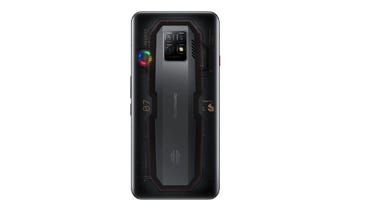Nubia RedMagic 7 Pro review: The coolest gaming phone you can buy | ZDNet
The transparent back design of the ‘Supernova’ edition hints at some of the parts powering the RedMagic 7 Pro.
The RedMagic 7 Pro is here and builds on the successes of its non-Pro sibling that launched in February, earlier this year. Besides carrying most of its predecessor’s key features like the Qualcomm Snapdragon 8 Gen 1 processor, a transparent back design, and side-mounted shoulder triggers, the RedMagic 7 Pro introduces some new tech that elevates the mobile gaming experience.
I’ve been testing the $899 RedMagic 7 Pro over the past two weeks, daily driving it alongside my iPhone 13 Pro. And while I wouldn’t go as far as to say that the device is capable of being a regular smartphone — its middling cameras are impractical — the 7 Pro is very much one of the most complete gaming phones that I’ve gotten my hands on.
Like
- 16GB RAM and 256GB base configuration is plenty
- Turbofan and shoulder buttons are practical
- 3.5mm headphone jack
- Notch-free display
Don’t Like
- Front and rear cameras are lackluster
- No IP rating for water and dust resistance
- No wireless charging
When it comes to gaming phones, speed is the name of the game. Exploring the RedMagic 7 Pro’s spec sheet, you’ll find numbers that rival the most expensive configurations of mainstream smartphones. That includes 16GB of RAM (18GB on my review unit), a 5,000mAh battery, the latest Snapdragon processor, and a 120Hz AMOLED display. See below for the specifications roundup.
Specifications
|
Processor |
Qualcomm Snapdragon 8 Gen 1 |
|
Display |
6.8-inch AMOLED, 2400×1080 pixels, 120Hz refresh rate |
|
RAM/Storage |
16GB/256GB (Obsidian) or 16GB/512GB (Supernova) |
|
Cameras |
64MP main camera, 8MP ultra-wide, 2MP depth sensor, and 16MP front under-display camera |
|
Battery |
5,000mAh with 65W fast charging |
|
Connectivity |
3.5mm headphone jack, USB-C, Bluetooth 5.2, Wi-Fi 802.11ac |
|
Colors |
Obsidian and Supernova |
|
Operating System |
RedMagic OS 5.0 based on Android 12 |
Design
About two weeks ago when I reviewed the Black Shark 4 Pro, I said that it looked more like a traditional phone than one made for gaming. With the RedMagic 7 Pro, my sentiment is the complete opposite. The RedMagic looks and feels like a device that would be in the hands of Tony Stark or one who operates the USS Enterprise. The main appeal here is the see-through finish of the 7 Pro’s Supernova variant. Even if I didn’t list out the specs above, you wouldn’t have a problem finding out what’s under the hood of this phone thanks to the bounty of marketing jargon and feature labels underneath the transparent backing.
That said, this blend of metal and glass creates a rather heavy body, a trade-off that you may want to think twice about when buying a gaming phone. The RedMagic 7 Pro weighs in at 235 grams (0.5 lbs) and the flat-edged design doesn’t help in making it any more wieldy. In a way, the phone feels a lot like the iPhone 12/13 Pro Max. But instead of the satin, monotone backing, you get an array of edgy designs, ports, and vents.
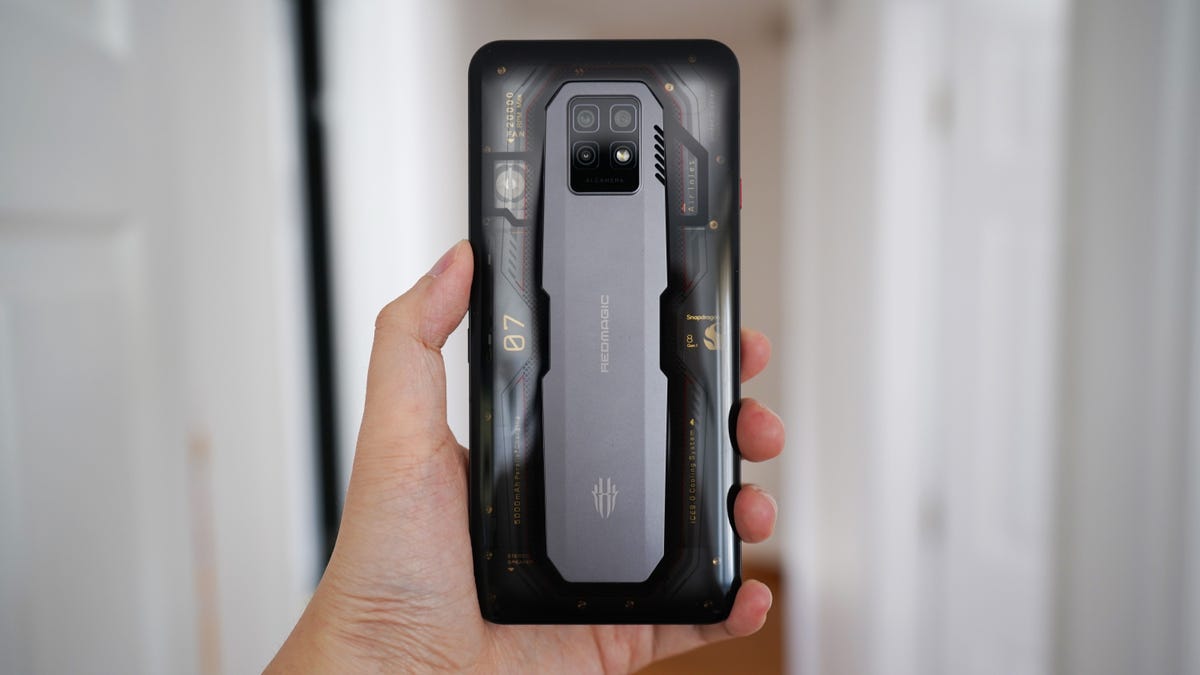
The backplate of the Supernova edition is a blend of glass and transparent materials.
June Wan/ZDNet
That’s right, the RedMagic 7 Pro has a total of four vents surrounding the edges and back of the device, in order to dissipate heat when running graphics-intensive tasks. Take a closer look at the phone and you’ll notice a small but mighty 20,000 RPM Turbofan. A part of RedMagic’s ICE 9.0 cooling system, the Turbofan automatically revs up whenever you open up a game or charge the device. While effective in managing battery consumption and overheating, this creates the first inevitable drawback of the phone: No water and dust resistance.
Besides the RGB fan and ventilation, there are two gaming-centric features built along the railing of the RedMagic 7 Pro: Shoulder triggers and a 3.5mm headphone jack. The former is not retractable, or physical at that. But with one on the top and bottom of the phone, you gain accessible and highly advantageous inputs when gaming. More on button mapping later.
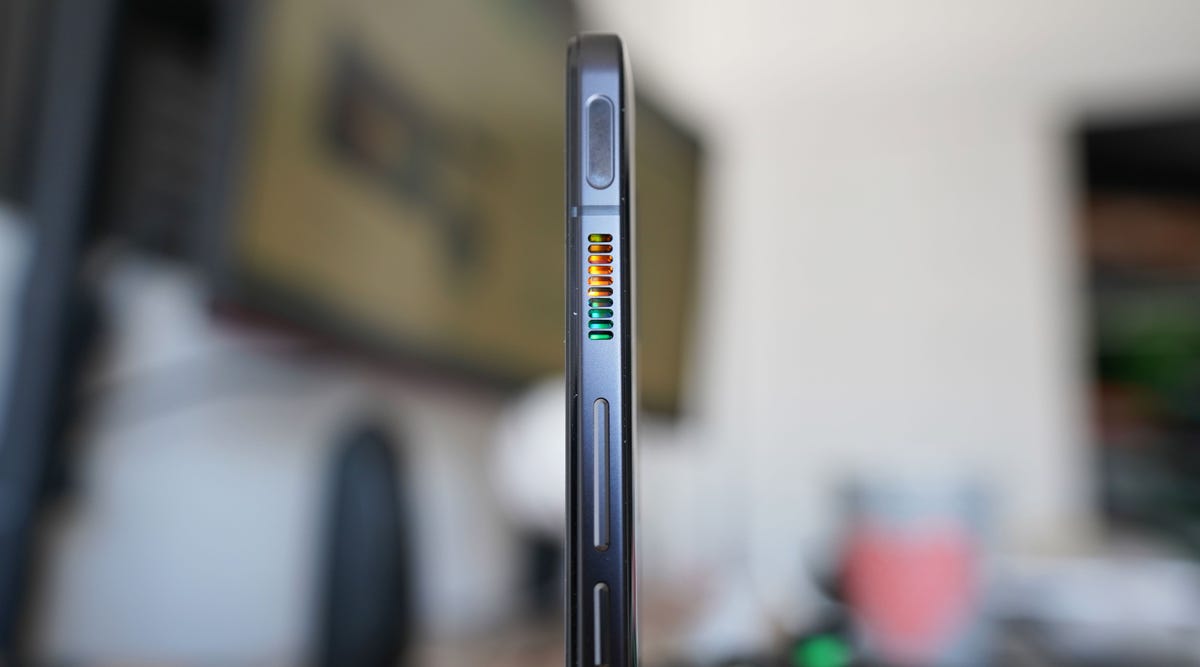
On the right side of the RedMagic 7 Pro is a cooling vent, shoulder trigger, volume rocker, and power button.
June Wan/ZDNet
On the front is a massive 6.8-inch AMOLED display, refreshing at 120Hz. While not 165Hz like the original RedMagic 7, the jump from 60Hz to 120Hz is much more noticeable than 120Hz to anything higher. This Goldilocks of a refresh rate means scrolling through the web, game menus, and the overall animations are buttery smooth.
Not to be mistaken with refresh rate, the 7 Pro also has a 960Hz multi-finger touch sampling rate, for an added degree of input accuracy. Though less useful for daily tasks, that number provides a competitive advantage in fast-scrolling games, where the rate at which you tap the screen can spell victory or defeat.
More: Top 10 smartphones to buy
Another display feature is the under-display camera (UDC). By using a tripod pixel arrangement, the same tech that powers the selfie camera of the Samsung Galaxy Z Fold 3 and ZTE Axon 20 5G, the RedMagic 7 Pro has a true distraction-free display. This also makes it the first gaming phone to use a UDC, which befits the immersion that mobile gamers seek. While practical when not in use, I found the front-facing camera to be very underwhelming with picture-taking. This shouldn’t come as a surprise, given the intricacies of embedding a camera under panels of pixels and how new this tech is. I applaud Nubia for taking the leap.
Software
The RedMagic 7 Pro runs on RedMagic OS 5.0 based on Android 12. For one, that’s a significant improvement from the majority of gaming phones that still run on Android 11 in 2022. What’s not so different is the assortment of UI tweaks, features, and themes that tailor more towards gamers than average consumers. From the wallpapers to the icon packs, you can expect more sci-fi-inspired aesthetics than nature and material designs.
That’s not to say that the software experience is bad by any means. I found RedMagic OS 5.0 very approachable and easy to maneuver around. Animations flow naturally across the screen, the notification panel is familiar, and with every new software feature comes a one to two-line explainer. At boot up, the phone had minimal bloatware atop the standard Google suite of apps.
As someone who prefers the clean, stock Android feel and finish, RedMagic OS 5.0 is not that. But weeks into using it, I’m starting to wish that more of its features were available across non-gaming phones.
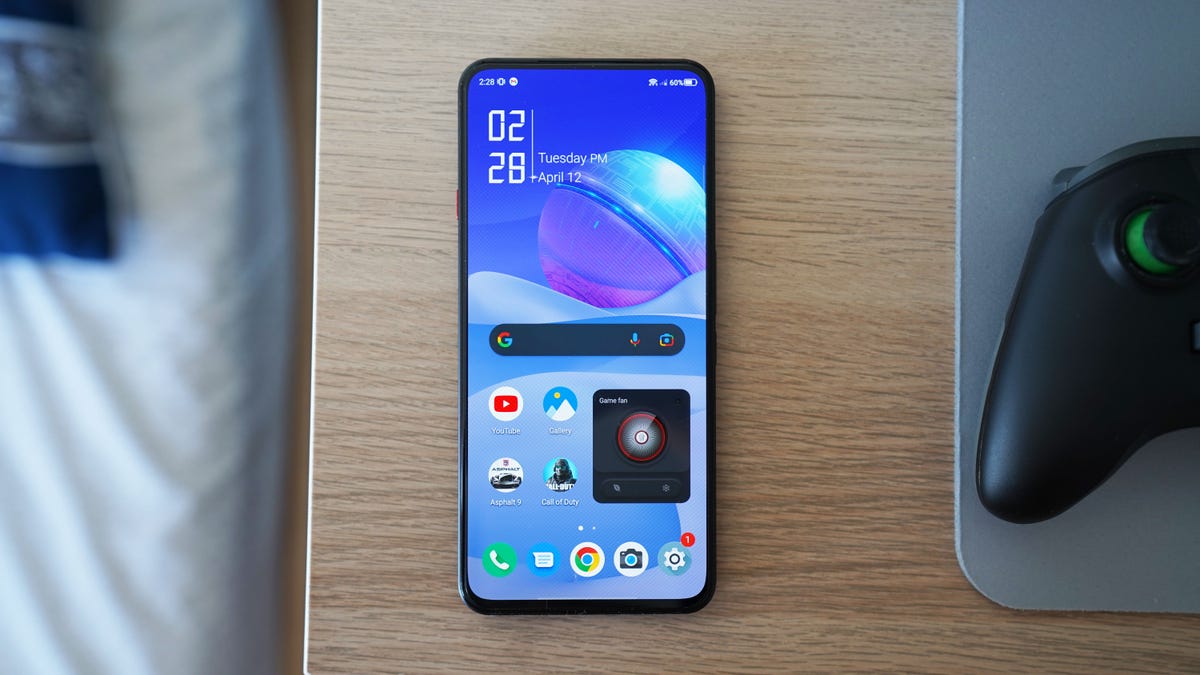
RedMagic OS 5.0 based on Android 12 is full of customizable features and widgets.
June Wan/ZDNet
Performance
The original RedMagic 7 was among the first smartphones to operate on Qualcomm’s new Snapdragon 8 Gen 1 chipset, and the Pro follows suit. With one of the most powerful SoCs, here’s how the RedMagic 7 Pro stacks up against competing phones in synthetic benchmark tests.
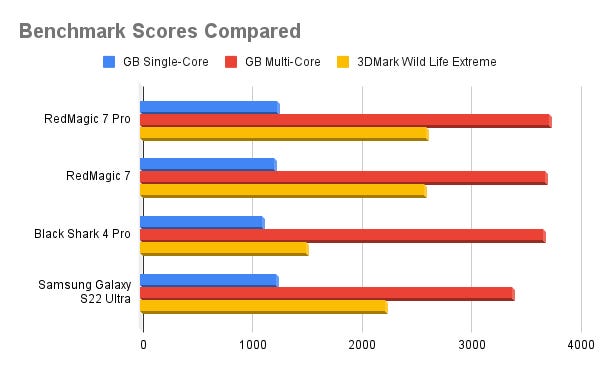
The Geekbench CPU Benchmark test measures the performance and efficiency levels of smartphones, tablets, and computers, by pacing them through a series of everyday tasks — like checking emails, playing music, and taking pictures.
Overall, the RedMagic 7 Pro performs exceptionally well across Geekbench 5 and 3DMark assessments. These are controlled and simulated use-cases and don’t reflect entirely on how the phone fares in reality. But it’s good to see that even at its limit (see 3DMark Wild Life Extreme score), the 7 Pro bests that of the Black Shark 4 Pro and Samsung Galaxy S22 Ultra with a score of 2,606.
Also: Best gaming phones
From my personal testing, the RedMagic operates my day-to-day activities like social media browsing, video streaming, emailing, and gaming, with ease. This didn’t come as much of a surprise as my review unit had a whopping 18GB of RAM. The new OnePlus 10 Pro has 8GB of RAM, for your reference. Naturally, apps and videos loaded with haste, games were playable in the highest graphics settings, and memory management was a non-issue.
Ultimately, how well does this phone handle gaming? Over the two weeks of testing, I paced the RedMagic 7 Pro through countless rounds of Call of Duty: Mobile, Genshin Impact, Asphalt 9, and Fortnite. Pleasantly, the phone handled the elite four mobile games like a champ. More often than not, the 7 Pro maintained graphics at 60 frames per second (FPS), and whenever the device felt hot to the touch, the in-body Turbofan kicked into high gear to cool it down. That’s on top of the existing vapor chamber plating within the device. Alternatively, you can snap on an external fan to keep the temperatures down.
The mobile gaming experience is also elevated by the side-mounted shoulder triggers, with a 500Hz touch sampling rate. Through RedMagic’s gaming hub, Game Space, you can map where on the screen you want left and right shoulder triggers to register. For example, I set the left trigger as aim and the right as fire in Call of Duty. Since the layout of these in-game buttons vary across titles, RedMagic lets you set mapping profiles within Game Space, a nifty feature that’s not prevalent on competing phones.
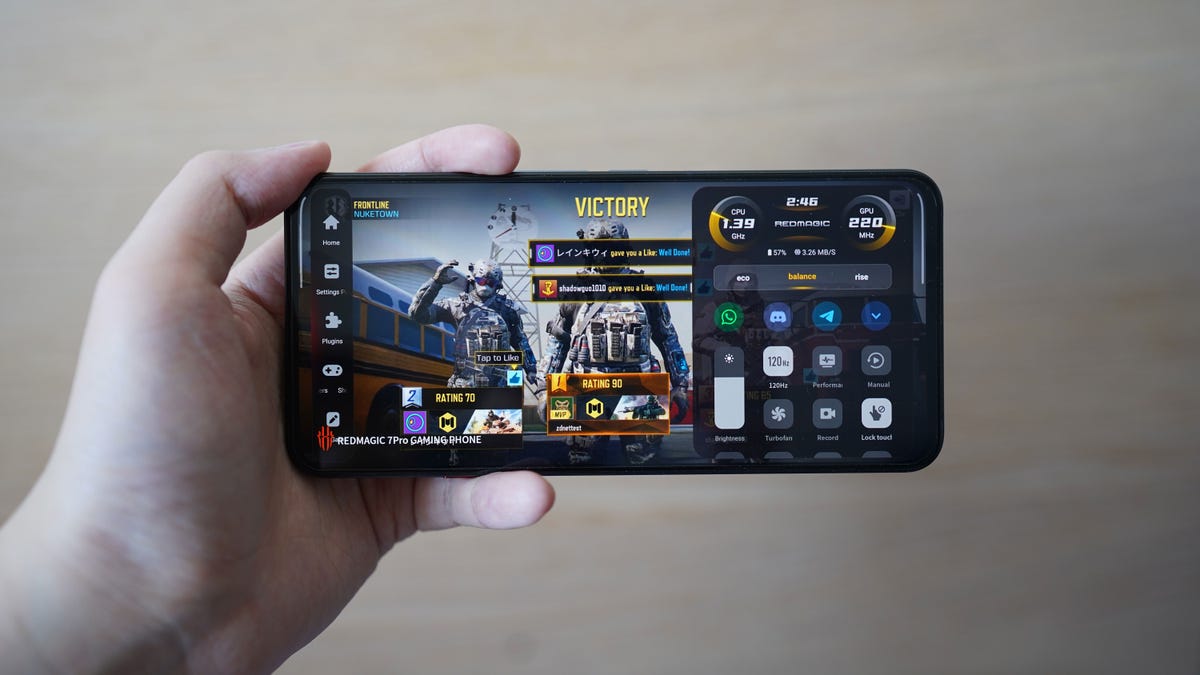
Game Space gives you an assortment of settings and toggles to keep your head in the game.
June Wan/ZDNet
Besides mapping the shoulder triggers, Game Space serves as an overlap atop any game you play. On it, you can learn about your connection, GPU speeds, and battery levels, and be able to manage incoming notifications. (You can’t climb the leaderboards with email pop-ups in the way, right?) There are two ways to activate Game Space: Clicking the dedicated button (in red) on the left side of the phone or swiping in from the upper edges when in-game.
Lastly, I’d like to make note of the haptics on the RedMagic 7 Pro. They are satisfyingly clicky and free of the loose buzzing that often plagues cheaper motors. Nubia accredits the quality of its haptics to its Red Core 1 gaming chip, a separate processor from the Snapdragon that strictly handles audio, RGB lighting, and vibration performance. While I’m unsure what kind of black magic marketing this is, the phone produces undeniably pleasing feedback — a blessing for any mobile gamer.
Camera
Camera performance has never been a point of emphasis for gaming phones and understandably so. As I mentioned at the start of the review, I found the rear triple-camera setup of the RedMagic 7 Pro to be decent at best.
In areas with ample lighting, the 64MP main camera can capture sharp and properly-focused stills but has a habit of oversaturating colors. While this makes photos look Instagram-ready, they leave little to no room for modifying or fixing in posts.
Stepping down from the main camera are the 8MP ultrawide and 2MP depth sensors. From testing, both lenses take passable photos but fail to capture much detail after sunset. On the bright side, Nubia has an anti-distortion feature that effectively straightens pictures taken with the ultrawide lens.

Picture taken with the under-display selfie camera.
June Wan/ZDNet
Another plus is the shutter speed of the camera. Comparing the RedMagic to the Samsung Galaxy S22 Ultra and the OnePlus 10 Pro, it surprisingly had the fastest response time when I’d tap the shutter button. There wasn’t any post-processing delay when opening the captured image, too.
More: Best camera phones to buy
And finally, the glorious under-display camera. My facial expression on the right is all you have to know about the quality of RedMagic selfies. Like other UDCs that I’ve tested, this one captures a base shot of your face and applies a heavy dose of sharpening afterward to accommodate the lack of clarity. This leaves you with a portrait that looks like it was taken with a smudged camera lens and is very low quality.
Battery
To make up for the cameras, the RedMagic 7 Pro blows you away with its super-fast, Neo Charging technology. In regions outside of North America, the phone is configured with 120W charging, meaning it can top up its 5,000mAh dual-cell battery in less than 20 minutes.
But if you live in the US or Canada, you’ll have to settle with a capped, 65W charging speed. Still, that’s very impressive and the 7 Pro can go from 0% to 100% in about 45 minutes. On most days, I’d plug the phone in as I washed up in the morning and come back to a fully charged device. Remember the Turbofan? That also kicks in when the RedMagic is fast charging, preventing the phone from overheating and the battery from degrading as quickly.
With its size and all the tech that’s inside, it’s a bummer that the RedMagic 7 Pro couldn’t make room for wireless charging. The standard has become essential to my day-to-day and it’s a convenience that you’ll have to live without when using the phone.
In terms of battery usage, I got an average of five hours of screen on time with the RedMagic. This was with the phone set to 70% brightness and 120Hz. For users who game heavily, I can see the device lasting for about three hours at most.
Bottom line
With all the hardware and software features on the Nubia RedMagic 7 Pro, it’s hard to name a gaming phone that ticks more boxes. For all that you’re getting, you’ll have to pay a price: $799 for the 256GB model and $899 for 512GB. At those prices, the phone becomes a harder sell to mainstream consumers who are better off buying the base model of the iPhone 13 or Samsung Galaxy S22. But if you fall in the mobile gaming niche and want the best of the best, the 7 Pro has your name on it.
The RedMagic 7 Pro goes on sale on April 27 in two configurations: Obsidian (16GB RAM/256GB) and Supernova (16GB RAM/512GB). Nubia says that early bird offers will be available starting April 22 but has yet to disclose any more information. We’ll be updating this review when there is.
Alternatives to consider
If you still weighing out options, here are some formidable alternatives to the Nubia RedMagic 7 Pro:
For all the latest Technology News Click Here
For the latest news and updates, follow us on Google News.

